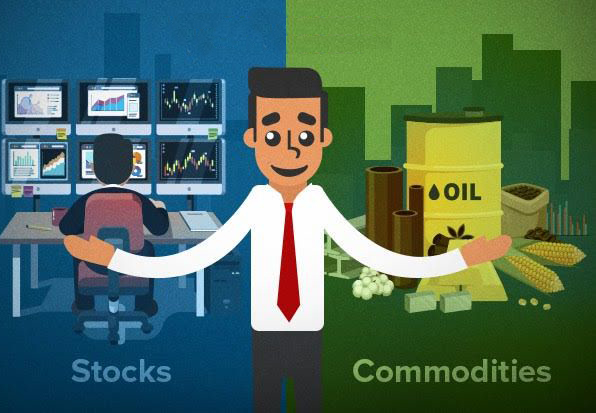We explained in this page what are commodities in finance, their categories, history and basic knowledge. From our long experience with the Commodities Jobs section, though, we are aware of a common mistake that many people make, by assuming that Futures market is like the stock market. Actually, while stocks and Futures are both “traded”, the similarities pretty much stop there. Here are basically the 3 major differences between stock market vs commodity market:

- You can “own” a stock and you can “enter into a contract” in Futures. Buying a stock, you’re literally buying a part of that company you’re investing in (that’s why stocks are referred to as shares: you’ll own a share of the company). In Futures, however, you are not actually buying the underlying commodity (corn, wheat, cotton or any of those): you’re entering into a contract for that commodity to be a buyer or a seller of it. By trading contracts and not the actual commodity, you have your chance to make money if the market is moving up or down. Most stock traders never consider selling a stock they don’t own, while in Futures that is very common because you don’t actually have to own the commodity to sell it, since we are dealing with the future delivery of that commodity, hence the name Futures. In fact, you can enter into a contract to supply it at a specific price, hoping to buy it at a lower price before the contract comes due. This would let you profit from the favourable difference in prices.
- Futures always have a Buyer and a Seller. Contracts require both parts. For every trader making money, there is a trader losing money: this means that Futures are always a zero sum trade. With few exceptions, the commodity markets are usually so liquid that it is never a problem to find someone to take the opposite side of your trade. In most cases, the fills are nearly instantaneous. In the stock market, instead, you can only purchase as many stocks as are available for sale by that particular Company. If that Company isn’t issuing any more stocks, and you can not find anyone willing to sell you their shares, you can’t buy any stocks in ABC Company at that moment. If a stock becomes particularly popular, or they don’t have a large issue of stock, it could be difficult to buy in, even if you want to. When you do buy stock in a company, you are investing your money in that company, hoping it will become more valuable in the future. However, that stock, based on the company’s value, is not guaranteed to remain that valuable. In Futures, instead, here is always a buyer to cover the other side of your contract.
- Futures have a time limit. As their name suggests, Futures contracts are contracts for delivery of a commodity in the future: that’s why commodity contracts always have a delivery month assigned to them. While you would never actually take delivery of a contract, it is important to be very aware of when it’s due to expire: as the contract gets closer to expiration, the market gets reduced, because only the traders who actually need to take delivery of that specific commodity will remain. On the opposite side, you can own a stock for as long as that company exists and “buy and hold” onto to a stock for as long as necessary to realize a profit is indeed a popular strategy among stock traders. In the Futures, instead, most traders couldn’t afford “buying and holding”, sustaining draw downs against their positions. If the stock loses value you’d be upset about it, but it wouldn’t cost you any extra money. It only means that you have lost part of your original investment if you decided to sell your shares right now. This fact gives you a little better staying power when trading stocks versus commodities.
As you can see, while stocks and Futures are similar, there are substantial differences between the two. It is vital that you recognize these differences so that you can better make informed trading decisions. One is not necessarily better than the other. They’re just different.
Further reading:
- Check the FCA’S market update, which sets out FCA’s views on the current regulatory challenges of the commodity derivative markets and how they will address them.
- Read all FAQs and Financial Jobs Industry Information.
